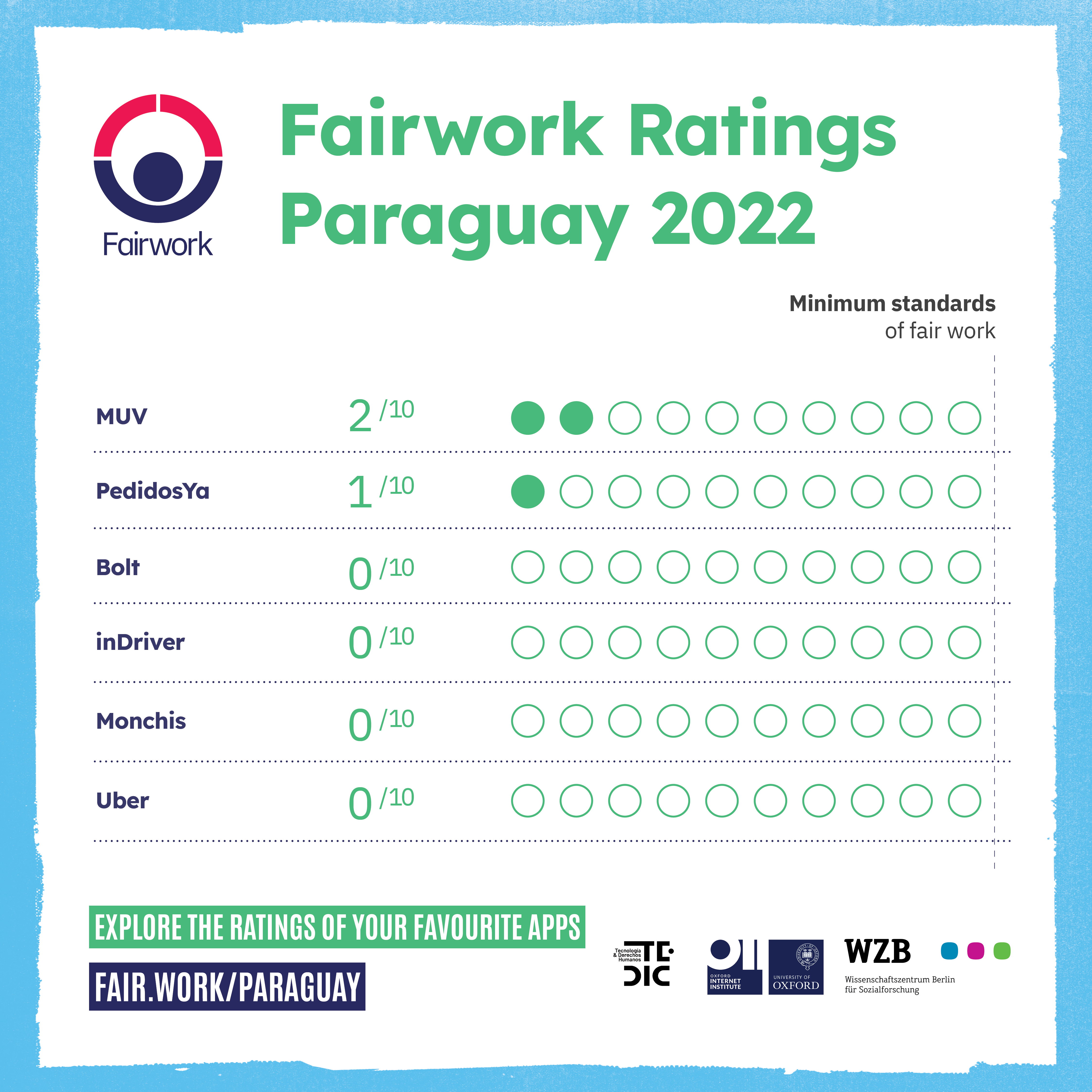Fairwork Paraguay Ratings 2022: Labour Standards in the Platform Economy

The platform economy in Paraguay is an undeniable reality. As such, it demands study and analysis to improve the lives of its workers.
Fairwork is an international action research project that evaluates working conditions in the platform economy in more than 30 countries. Digital labour platforms are scored against five principles of fair work: Fair Pay, Fair Conditions, Fair Contract, Fair Management and Fair Representation. For each principle, platforms can score up to two points, if there is sufficient evidence that platforms meet all the relevant thresholds.
Fairwork has forged an alliance with TEDIC to evaluate six ride-hailing and delivery platforms operating in Paraguay: Bolt, Uber, inDriver, Muv, PedidosYa and Monchis. The resulting very low scores highlight that much remains to be done to guarantee basic labour standards for platform workers in Paraguay. Out of the six studied platforms, only two platforms, MUV and PedidosYa, were able to score any points.

Key findings
Fair Pay: We did not find sufficiently robust evidence that any platform has mechanisms or practices in place to ensure that workers earn at least the local minimum wage or a living wage after subtracting costs. Therefore, no platform could be awarded a point for the principle of fair pay.
Fair Conditions: We did not find sufficient evidence that platforms in Paraguay take measures to mitigate work-related health and safety risks or that they provide a safety net for workers. Therefore, we were unable to grant this point to any of the six evaluated platforms. It is worth noting that all platforms require workers to have some kind of insurance such as liability or vehicle insurance, however, it is the workers who bear the cost of this insurance. Lastly, we were not able to evidence that platforms offer workers sick pay in the case of illnesses other than COVID-19.
Fair Contracts: Only PedidosYa was awarded the first point for fair contracts. This platform has a legal presence in the country and its contract is available in Spanish and accessible to workers at all times. Moreover, changes to the contract can only be made with the written agreement of both the worker and the platform. No platform could be awarded the second point for fair contracts because we did not have sufficient evidence that platforms take appropriate steps to ensure that their contracts or terms and conditions do not exclude liability for negligence nor unreasonably exempt the platform from liability for working conditions.
Fair Management: Only one platform, MUV, was able to score on this principle. Our research showed that MUV has efficient channels for workers to communicate with a human platform representative and that there is a documented process for workers to appeal disciplinary actions. Moreover, MUV has an anti-discrimination clause in its contract and a documented commitment to achieve gender parity across its driver fleet. Based on this evidence, MUV was awarded the first and the second point for the principle of fair management.
Fair Representation: We were not able to evidence the existence of a documented mechanism for the expression of collective worker voice for any platform, or of a formal policy indicating platforms’ willingness to recognise and bargain with a collective body of workers or a trade union. Therefore, no points could be awarded to any of the studied platforms for this principle.
Final Considerations
In light of these findings, platforms must take concrete steps to ensure that their workers have basic labour rights.
From TEDIC, and in partnership with the Fairwork project, we have applied the Fairwork methodology to the Paraguayan context with the primary objective of promoting positive change for workers without neglecting the broader ecosystem of actors in the digital economy and innovation landscape. It is essential to generate spaces for debate that guarantee the full enjoyment of labour rights enshrined in the current Paraguayan legal framework. At the same time, such space should strengthen the nascent ecosystem of the digital economy in Paraguay.